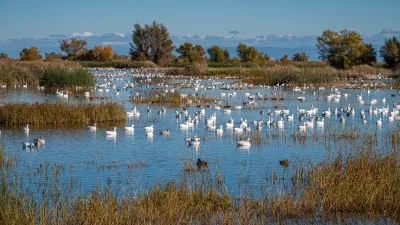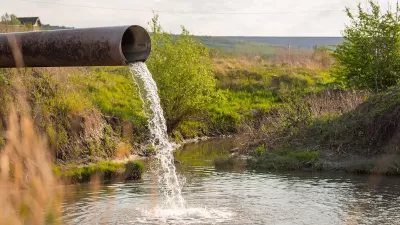The D.C. Water and Sewer Authority wants to revise a settlement reached eight years ago with environmental groups that would have seen the agency build three huge tunnels to manage storm water runoff. The Authority would like to build green systems.
Today, the Supreme Court will hear arguments in a case meant to establish who's to blame for polluted storm waters entering L.A.'s waterways. Within miles of the court, residents and officials in Washington are debating how to manage the same issue, with the D.C. Water and Sewer Authority seeking to back out of an agreement reached eight years ago to settle a federal lawsuit with local environmental groups. The Authority had agreed to build three giant tunnels to stop pipes from overflowing during heavy storms.
"But now," says reporter Darryl Fears, "the three-tunnel solution is in doubt, and activists, engineers and bureaucrats are arguing once again about the best path to cleaner waters. Although digging is underway for the first tunnel, D.C. Water wants to put the other two on hold and instead see whether rain gardens, retention ponds and grass rooftops can soak up as much storm-water runoff as the pipes can store."
"Among local environmental activist groups, a verdict on the request is already clear: Don’t do it. Some are enraged; others have expressed dismay about the proposal."
Although the green system has the potential for offering benefits beyond filtering storm water (such as cooling and beautifying the city), many are concerned about D.C. Water's request for an additional eight years to build and test an experimental green infrastructure project. "Opponents say that if the green pilot project wins approval, billions of gallons of sewage would pour into the Potomac and Rock Creek for eight years while D.C. Water conducts its tests."
The debate over the proposal has already cost the head of the D.C. Department of the Environment (DDOE), Christophe Tulou, his job after he expressed reservations about how well the green infrastructure project could perform.
FULL STORY: D.C. debates best path to cleaner waterways

Maui's Vacation Rental Debate Turns Ugly
Verbal attacks, misinformation campaigns and fistfights plague a high-stakes debate to convert thousands of vacation rentals into long-term housing.

Planetizen Federal Action Tracker
A weekly monitor of how Trump’s orders and actions are impacting planners and planning in America.

San Francisco Suspends Traffic Calming Amidst Record Deaths
Citing “a challenging fiscal landscape,” the city will cease the program on the heels of 42 traffic deaths, including 24 pedestrians.

Defunct Pittsburgh Power Plant to Become Residential Tower
A decommissioned steam heat plant will be redeveloped into almost 100 affordable housing units.

Trump Prompts Restructuring of Transportation Research Board in “Unprecedented Overreach”
The TRB has eliminated more than half of its committees including those focused on climate, equity, and cities.

Amtrak Rolls Out New Orleans to Alabama “Mardi Gras” Train
The new service will operate morning and evening departures between Mobile and New Orleans.
Urban Design for Planners 1: Software Tools
This six-course series explores essential urban design concepts using open source software and equips planners with the tools they need to participate fully in the urban design process.
Planning for Universal Design
Learn the tools for implementing Universal Design in planning regulations.
Heyer Gruel & Associates PA
JM Goldson LLC
Custer County Colorado
City of Camden Redevelopment Agency
City of Astoria
Transportation Research & Education Center (TREC) at Portland State University
Jefferson Parish Government
Camden Redevelopment Agency
City of Claremont





























